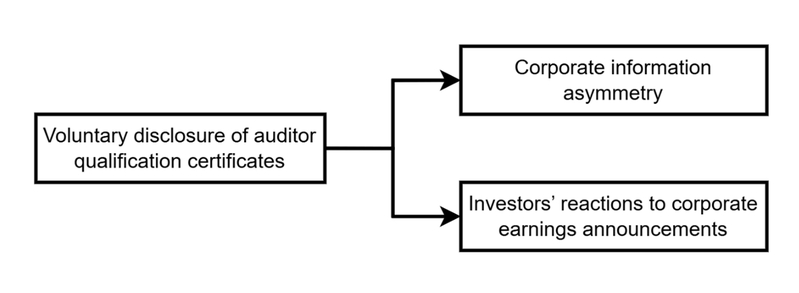This study examines the capital market consequences of the voluntary disclosure of individual auditor information. Specifically, we examined whether and how the disclosure of auditor qualification certificates is associated with information asymmetry and investors’ responses to earnings. Regulators have recently started to focus on disclosing auditor information beyond their names such as in China, where it is increasingly important in practice. Although prior studies have demonstrated benefits associated with the mandatory disclosure of partners’ names, there is relatively little evidence of the usefulness of additional information about individual auditors that could be provided voluntarily. This study sheds light on the economic consequences of disclosing detailed information about individual auditors and extends the voluntary disclosure literature. We tested the following hypotheses in this study: (a) voluntary disclosure of auditor qualification certificates is associated with lower information asymmetry and (b) voluntary disclosure of auditor qualification certificates is not associated with investors’ reactions to corporate earnings announcements. We first crawled the annual audit reports of listed companies in China and used machine learning methods to capture voluntary disclosure of auditor qualification certificates. In a sample of more than 14,000 Chinese company-years from 2012 to 2018, we identified 10.5% of the observations voluntarily disclosing auditor qualification certificates. We used the bid-ask spread as the proxy of information asymmetry, and the earnings response coefficient refers to the coefficient on unexpected earnings to the cumulative abnormal returns. We found that the voluntary disclosure of auditor qualification certificates is associated with lower information asymmetry and stronger market reaction to earnings announcements. The main results hold through various robustness tests. Cross-sectional analyses show that this association is less pronounced when a company employs a larger audit firm or has higher analyst coverage. Further, the specific information conveyed by the auditor qualification certificate, such as the auditor’s facial trustworthiness, helps explain the economic consequences associated with voluntary auditor qualification certificate disclosure. Moreover, an initial disclosure of auditor qualification certificates is associated with greater effects.

Figure 1. Capital market consequences of information about individual auditors
If you are interested in the research, please read the paper:
Wu Bin, Liu Yunjing, Zhang Min, & Zhang Ziyi. (2024). Capital Market Consequences of Information about Individual Auditors. The International Journal of Accounting, 2450013. DOI: https://doi.org/10.1142/S1094406024500136
A full version of this article could be viewed at:
https://www.worldscientific.com/doi/abs/10.1142/S1094406024500136

Nanjing University of Aeronautics and Astronautics
Copyright 2017 | All Rights Reserved with NUAA
